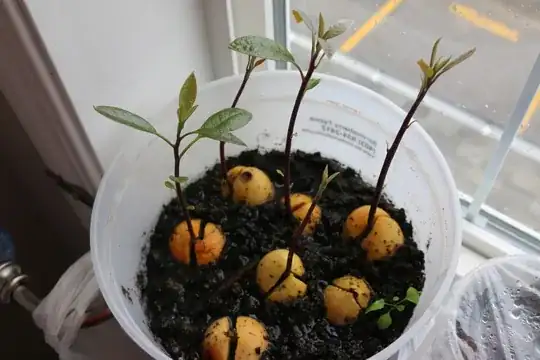I've found that avocados tend to grow a deep root system, so when you start seeing roots coming out the bottom of the pot, it's DEFINITELY time to transplant them to a bigger pot. With the photo included, I'd only have put maybe 2-4 seeds in it, tops. I just transplanted 4 of my avo seeds about the same height as those in the picture, into a 50L rubbish bin (comes with handles, which is handy - I drilled some holes at the bottom for drainage with some flat wood drill bits - it was only maybe 2-3mm of plastic to drill into so just did it slowly and didn't do any damage to it). I chose a rubbish bin because it was more deep than wide (and I struggled to find deep plant pots - no one seemed to have them - so I resorted to the next best thing), because they tend to grow roots downwards pretty quickly.
When they're older, I'd personally only want the avo trees to get to 2-3 meters high above ground. Any higher and you're just putting more painstaking effort into getting the fruit (why make it hard on yourself?).
In terms of avo's growing slowly, like the 2 seeds mentioned. If they haven't caught up to the others after a few months, they're probably weaker. A good indication of plant health is how quickly it grows (with exception to permanently slow growing plants, like the Jaboticaba). Also, if it's struggling to push roots through chunky soil (rocks, big chunks of bark, etc.), then it's going to slow down the growth, and potentially produce fruit that indicates its hard struggle in life (so choose a soft/fluffy/fine organic potting mix
for when you're transplanting them to their 2nd to last, or final, destination). It's like Paul Gautschi says with kale, if the leaves are bitter, the plant is indicating its bitterness of how hard life was for the plant, because it struggled to grow. Kale shouldn't be bitter. Same goes for other plants. Give it the right stuff and make it happy.
